It's a Tuesday after ninth period and I'm walking down the hallway of my South Bronx school toward what looks unmistakably like a fight. A tight circle of high school boys are gathered around two other boys on the floor outside of the classroom where I teach theater. One of the boys appears to be pounding the other with his fist. The other kids are chanting, "Yeah! Yeah! Yeah!"
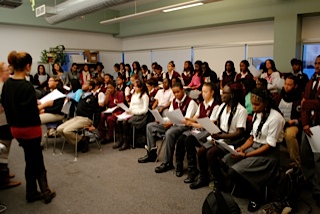
The scene doesn't make sense to me. Sure, we have our fair share of hallway scuffles, but compared to most schools in the neighborhood, ours isn't terribly violent. I get closer and recognize that all the kids in the group are cast members in
Les Miserábles, the spring musical I'm directing. Now I'm even more confused. Some of these kids may struggle academically and some have tough home lives, but there's not a bully or a thug among them. Even so, the energy of the scene automatically triggers memories of my early days as a new teacher breaking up fights in the back of my classroom, memories that are quick to surge up and flood me with adrenaline despite the
trusting relationships I've built with my students, the
leadership work they've done over the years and the
creative challenges we've faced together while developing a musical theater program at Bronx Prep.
The chanting gets louder. I race down the hall.
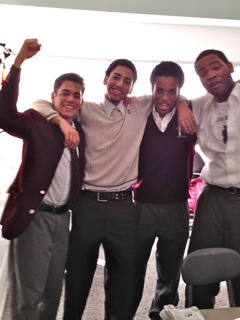
When I get to the scene, the circle of kids unknots itself and I struggle to make sense of what I'm seeing. George -- the student on the floor -- is laughing so hard he can barely breathe. The boy kneeling over him is not punching him, but hugging him and slapping him on the back with enough enthusiasm and force to have toppled them both over. Several of the boys around them are wiping tears out of their eyes. At first I assume they're tears of laughter.
I ask what's going on.
Thomas, the boy doing the hugging, stands up and straightens his tie, then extends a hand to George, the senior who plays the show's lead, Jean Valjean. George stands up, shoots me a sheepish grin and coaxes Jasmine, who plays one of the other leads, Fantine, out of the stairwell at the end of the hallway where she is burying her face in her hands. She blushes and smiles shyly.
"Um, yeah, so we were just singing Fantine's death scene for the guys, here," says George.
"Yeah," says Thomas. "And it was so awesome that they made everybody cry."
I look around at the boys. With the congratulatory brouhaha I'd mistaken for a smack-down fully subsided now, I can feel the lingering charge of the emotion that incited it. The guys are embarrassed, avoiding my gaze, kicking the tile floor with their sneakers. One kid wipes a tear-stained cheek with his shoulder. "I don't cry," he says, matter-of-factly. "Ever. But that was really, really good."
I'm stunned.
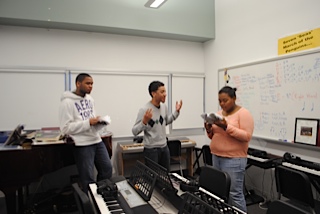
First of all, before we even get to the crying thing, there's the simple fact that the kids are rehearsing on their own. Finally, after nine years spent building up a
performing arts program from scratch through what has mostly felt like sheer force of adult will -- the endless hours my colleagues and I have spent begging students to show up on time and get to work, calling kids' homes after every missed practice, trying to convince young people whose default setting for self expression is texting and tweeting that real art takes time, discipline and painstaking follow-through -- this moment offers a glimmer of hope that maybe, just maybe, this group of kids is finally starting to take ownership of their creative process.
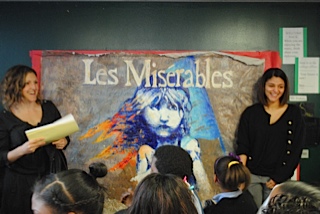
Secondly, it occurs to me that my initial fears that urban teenagers wouldn't connect emotionally to an operetta set in 19th century France might have been unfounded. Could it be that they are actually starting to understand and connect to these characters?
Finally -- and here's the kicker: In a neighborhood where so many of the kids I interact with every day seem to spend the bulk of their energy trying to convince the world how tough they are, how unfeeling they are, how little they care about what happens to them or the people around them -- where even the appearance of emotional vulnerability can equal social rejection, a serious ass-beating, or worse -- these kids are not only crying openly in front of each other -- they're crying over
musical theater.
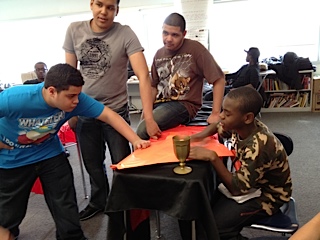
Partly this phenomenon has to do with this particular group of kids and the coming of age of a program that has been nearly a decade in the making. Our school is a combined middle and high school that spans 5th to 12th grade, and we've been putting on musicals since 2006, so our older kids have formed close bonds, establishing a tightly-knit culture of positivity, creative risk-taking and emotional support. Two of our senior cast members have received acceptances (and full rides) to competitive BFA programs in acting and set design from SUNY Purchase and Ithaca respectively. And my co-director on this show is former Bronx Prep student and musical theater star
Denisse Polanco,
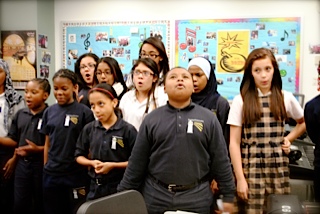
who earned her undergraduate degree in Arts in Education from Hobart and William Smith Colleges in 2011 and has returned to Bronx Prep this year as a theater teacher and speech coach. With so many successful upper classmen and alumni leading them, it's not surprising that younger students coming up through the ranks of the program are feeling inspired this year.
But there's more to it than that. The level of commitment we're seeing this year is bordering on a weird kind of fervor. Put simply, the kids have become
Les Mis freaks. Students who claim to "hate reading" are devouring the Victor Hugo novel the show is based on. Cast members who say they don't care about history or math are making Google maps of Paris and calculating travel times for revolutionaries carrying ammunition from one end of the city to the other.
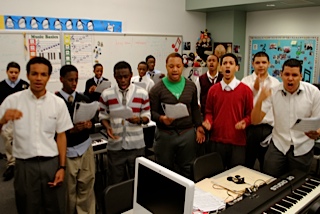
While we lost some cast members who couldn't get their grades up in time, a large number of students who were failing four and five classes as of a few months ago are now staying at school until all hours and getting tutored by their fellow actors so they can meet academic requirements and stay in the cast.
In all my years making theater in the Bronx, I've never seen kids give this much of a damn about a show before. Ironically enough -- given how far removed it is from them in terms of time period, geography, race and culture -- I think it's because we've never done a show that connects so directly to their lives.
The first moment I realized that the kids were understanding the story more deeply than I ever had at their age was the first week of rehearsals when we started learning the big musical numbers.
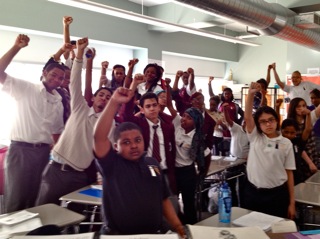
Put it this way: When a roomful of young people -- many of whom can trace their families' roots directly back to the Middle Passage and the Triangle Trade -- instinctively launch their fists up when they sing, "It is the music of a people who will not be slaves again!" there's an electricity in the air that was noticeably absent from the version of "The People's Song" I sang with my high school choir back in Wilton, Connecticut.
I sat in the classroom that day listening to the kids sing with every hair on my arms standing on end, thinking, "
Victor Hugo couldn't possibly have predicted it, and
Cameron Mackintosh couldn't have known it either, but I'm pretty sure this show was created for this exact group of kids to perform at this exact moment in history." Since that first week of rehearsal, the kids have been discovering resonant overlaps between the student uprisings at the heart of
Les Miserábles and the expansive revolutionary spirit -- as well as the countervailing energies of apathy, cynicism and fear -- fueling so many present-day events. One of our student leaders, a 12th grader named
Ruth, recently designed and ran a workshop for the cast called "What Is Your Breaking Point?" in which she helped kids understand the uprisings in
Les Mis by analyzing blog posts written by real-life student participants in the
Occupy movement, the
Arab Spring, and the
Million Hoodie March organized in protest over the death of Trayvon Martin.
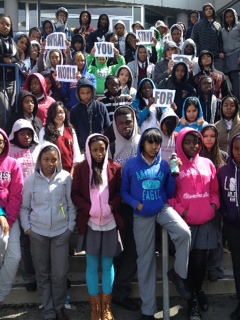
"When a bunch of Bronx Prep kids are debating whether to wear hoodies to school in honor of Trayvon -- and some of them are cynical about whether their act of defiance will actually mean anything in the end," Ruth says, "that's really not so different -- on a basic level -- from these kids in Paris in the 1800s deciding whether or not to stand up and fight on the barricade for what they believe in."
Even more compelling in my view than "text-to-world" connections the kids are making are the "text-to-self" connections -- the very specific and intimate ways they see their own lives and families' experiences reflected in their characters' stories. Every day more of these art-and-life intersections surface, and every time another student talks about how they see themselves in this show, I get chills. Here are three examples the kids have shared over the last few days:
Thomas (the enthusiastic young actor from the hallway scene) says that playing the role of Marius, who wrestles over whether to risk death on the barricade for his revolutionary ideals, has given him a deeper understanding of the agonizing moral dilemmas his grandparents faced living under the brutal dictatorship of Trujillo in the Dominican Republic in the 1950s.
For a junior named Miguel, the play's critique of the criminal justice system hits home directly. Like Jean Valjean, Miguel's older brother went to prison for a crime he committed in the process of trying to help someone, and then found he couldn't get a job with a living wage when he got out, "not even a job at McDonald's," Miguel says. Miguel's favorite part of the show is when Valjean, embittered by his treatment in jail, steals a silver cup from a bishop, who responds with a surprising gift of two silver candlesticks and an inspiring admonition to Valjean to change his ways and walk a path of redemption. The bishop's radical act of generosity reminds Miguel of the life-changing employment assistance his brother has recently received from the state.
Tenth grader Jada says that in the awful days following the shooting death of her brother Jared this February, the lyrics of "The Café Song (Empty Chairs at Empty Tables)" played through her head constantly, bringing her unexpected stretches of a "strange kind of comfort" at a time of overwhelming grief.
***
Over the last several decades, budget cuts and the pressures of high-stakes standardized testing in English and math have either squeezed arts education out of middle school and high school curriculum completely or reduced it to a frivolous, once-in-a-while add-on in a huge number of schools across the country. Programming losses have hit students in the nation's poorest districts the
hardest. Cuts to arts education programs fly in the face of abundant research confirming what those of us lucky enough to continue this work know in our bones: that arts education is more than just a tool for boosting test scores and
closing the achievement gap. Access to rich and relevant learning opportunities in the creative arts is a fundamental human right -- a right worth fighting for.
***
Les Miserábles Student Edition will be performed at Bronx Prep May 21st-23rd at 7 PM with a special encore performance including student reflections and stories in Manhattan on Friday, May 25th at 7 PM. For more information please contact kquarfordt@bronxprep.org.
As always, the students featured in this post agreed to let me share their stories; the views expressed here are my own and not those of my school's administration.
(This article also appeared on the
Huffington Post.)
Photo credits: Geoffrey Kiorpes, Joy Akinfenwa, Kate Quarfordt




















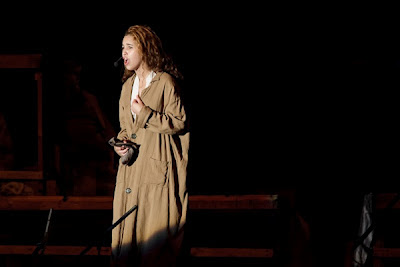

























 The scene doesn't make sense to me. Sure, we have our fair share of hallway scuffles, but compared to most schools in the neighborhood, ours isn't terribly violent. I get closer and recognize that all the kids in the group are cast members in Les Miserábles, the spring musical I'm directing. Now I'm even more confused. Some of these kids may struggle academically and some have tough home lives, but there's not a bully or a thug among them. Even so, the energy of the scene automatically triggers memories of my early days as a new teacher breaking up fights in the back of my classroom, memories that are quick to surge up and flood me with adrenaline despite the
The scene doesn't make sense to me. Sure, we have our fair share of hallway scuffles, but compared to most schools in the neighborhood, ours isn't terribly violent. I get closer and recognize that all the kids in the group are cast members in Les Miserábles, the spring musical I'm directing. Now I'm even more confused. Some of these kids may struggle academically and some have tough home lives, but there's not a bully or a thug among them. Even so, the energy of the scene automatically triggers memories of my early days as a new teacher breaking up fights in the back of my classroom, memories that are quick to surge up and flood me with adrenaline despite the 
 First of all, before we even get to the crying thing, there's the simple fact that the kids are rehearsing on their own. Finally, after nine years spent building up a
First of all, before we even get to the crying thing, there's the simple fact that the kids are rehearsing on their own. Finally, after nine years spent building up a  Secondly, it occurs to me that my initial fears that urban teenagers wouldn't connect emotionally to an operetta set in 19th century France might have been unfounded. Could it be that they are actually starting to understand and connect to these characters?
Secondly, it occurs to me that my initial fears that urban teenagers wouldn't connect emotionally to an operetta set in 19th century France might have been unfounded. Could it be that they are actually starting to understand and connect to these characters?
 who earned her undergraduate degree in Arts in Education from Hobart and William Smith Colleges in 2011 and has returned to Bronx Prep this year as a theater teacher and speech coach. With so many successful upper classmen and alumni leading them, it's not surprising that younger students coming up through the ranks of the program are feeling inspired this year.
who earned her undergraduate degree in Arts in Education from Hobart and William Smith Colleges in 2011 and has returned to Bronx Prep this year as a theater teacher and speech coach. With so many successful upper classmen and alumni leading them, it's not surprising that younger students coming up through the ranks of the program are feeling inspired this year. While we lost some cast members who couldn't get their grades up in time, a large number of students who were failing four and five classes as of a few months ago are now staying at school until all hours and getting tutored by their fellow actors so they can meet academic requirements and stay in the cast.
While we lost some cast members who couldn't get their grades up in time, a large number of students who were failing four and five classes as of a few months ago are now staying at school until all hours and getting tutored by their fellow actors so they can meet academic requirements and stay in the cast. Put it this way: When a roomful of young people -- many of whom can trace their families' roots directly back to the Middle Passage and the Triangle Trade -- instinctively launch their fists up when they sing, "It is the music of a people who will not be slaves again!" there's an electricity in the air that was noticeably absent from the version of "The People's Song" I sang with my high school choir back in Wilton, Connecticut.
Put it this way: When a roomful of young people -- many of whom can trace their families' roots directly back to the Middle Passage and the Triangle Trade -- instinctively launch their fists up when they sing, "It is the music of a people who will not be slaves again!" there's an electricity in the air that was noticeably absent from the version of "The People's Song" I sang with my high school choir back in Wilton, Connecticut. "When a bunch of Bronx Prep kids are debating whether to wear hoodies to school in honor of Trayvon -- and some of them are cynical about whether their act of defiance will actually mean anything in the end," Ruth says, "that's really not so different -- on a basic level -- from these kids in Paris in the 1800s deciding whether or not to stand up and fight on the barricade for what they believe in."
"When a bunch of Bronx Prep kids are debating whether to wear hoodies to school in honor of Trayvon -- and some of them are cynical about whether their act of defiance will actually mean anything in the end," Ruth says, "that's really not so different -- on a basic level -- from these kids in Paris in the 1800s deciding whether or not to stand up and fight on the barricade for what they believe in."